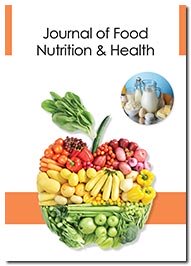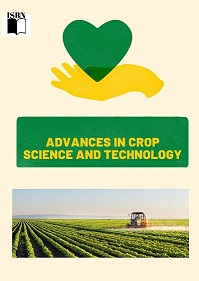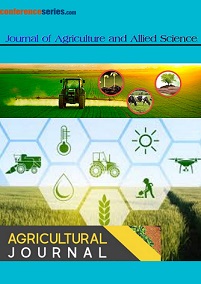Join us at our online event "15th Crop science and Agriculture summit", scheduled on 9th December 2020
Click on Special Registration
(Certificates & Conference materials will be provided as soft copies to each and every registered participants)
With the successful series of the Crop Science & Agricultural Conferences, ME conference feels honoured & privileged to invite speakers, students, delegates specialists across the globe to its “CROPS MEET 2020 (Webinar)” to be held on 10th December 2020. The Committee members have been committed to establish a unique research platform for the scientists as well as research professionals & the business entrepreneurs with the theme “Emerging Trends & Technologies in Sustainable Agricultural Practices and Crop Science”.
Crop science and Agriculture conference is a common platform for deans, professors, scientists, students, research scholars, directors, and other participants like the consultant, economist, project manager from business and industrial sectors to establish a scientific relationship between academic experts and other participants through sharing information. This is an open event; we welcome and invite you to participate in this prestigious agriculture and crop science online meeting. Our conference programs aim to provide delegates the intellectual stimulus and opportunity to plan the next steps for their organization, departments, and careers.
Scope and importance?
Agriculture is the fundamental source of food of all the countries in the world, whether Undeveloped, developed or developing. Raising the supply of food by the agricultural sectors has, therefore, extraordinary significance for the economic growth & development of every country. Horticulture is the science of developing the soil, developing crops and raising animals in farms etc. It includes the preparation of plant and animal products for people to use and their distribution to markets. Agriculture gives most of the world's food and fabrics. America's agriculturists and farmers always make a vital commitment to the U.S. economy by ensuring safe and solid food supply, improving energy security and supporting work development as well as economic development. The United States is the world's leading exporter of agricultural products.
Target Audience
-
Agriculture Science Faculty, Students, Scientists, Agriculturalists
-
Plant Science Faculty, Students, Scientists
-
Agricultural Universities
-
Agriculture and Plant Associations and Societies
-
R&D Laboratories
-
Agricultural Students, Scientists
-
Business Entrepreneurs
-
Training Institutes
-
Forestry and Landscaping Scientists
-
Seed Science and Technology
-
Soil science and soil-plant nutrition
-
Manufacturing Agricultural Devices Companies
Crop science is the highly integrative science including plant breeding, transgenic crop improvement, plant physiology and improved varieties of agronomic turf utilizing developed cropping system and local crops to produce food, feed, fuel, fiber for developing population. Last century crop science achieved successes, which are now the portions of standard of living. The role of crop science for biofuel production will increase in the upcoming years. Compounds like Starch, carbohydrate, sucrose can be converted into biofuel and ethanol for optimization of biomass yield and minimizing the inputs of fertilizer, irrigation, and pesticides in the crop fields. Hence, it needs to grow all bioenergy crops. Results in the bioenergy crops yield will minimize the competition between biofuel crops and human food crops.
-
Transgenic crop
-
Crop physiology and metabolism
-
Crop breeding and genetics
-
Crop Ecology, production, and management
Agriculture is the process of food cropping and animal farming for providing food, fiber, medicinal plant and many other things to sustain and enhance our standard living & life. Horticulture is a form of agriculture which includes special methods and techniques to increase plant products, like vegetables, flowers, medicinal plants, nuts, seeds, herbs, sprouts, mushrooms, algae, seaweed, grass, and decorative trees and plants. Through the methods & techniques of horticulture, we can do plant conservation, landscape restoration, soil management, and garden design, construction and maintenance and arboriculture. Horticulturists normally work in the plant development, plant quality, and nutrition, and protect plants from insects, pests, disease, and environmental anxieties.
-
Seed physiology, production, and technology
-
Plant preservation
-
Nutrition quality
-
Environmental anxieties
-
Soil management
Agrobiology has a great importance with the plant nutrition & their growths in relation to soil condition, especially to determine the innovative ways to increase crop production. Biological resources include agriculture, forestry, and biologically-derived waste & many more. The application of microorganisms, such as the diverse bacterial species for plant growth, represents an ecologically and economically sustainable strategy. The use of these bio-resources for the enhancement of crop productivity is gaining importance globally.
-
Animal health and welfare
-
Plant Nutrition and Health
-
Organic Agriculture
Biodiversity promotes ecosystem productivity as well as longevity where each species, no matter how small or big, all have an important role to play, which maintains the ecosystem. Biodiversity provides well-functioning ecosystems that supply pure oxygen, clean air and water, pollination of plants, pest control, wastewater treatment and many ecosystem services, which is very essential to maintain a healthy ecosystem with healthy standard of living. It represents a wealth of systematic ecological data that help us to understand the natural world and its origins. Any loss or deterioration in the condition of biodiversity can compromise all the values like cultural, economic as well as ecological support, for the living beings.
-
Conservation and Management
-
Ecological Informatics and Modelling
-
Climate and Carbon Exchange
-
Historical and Retrospective Studies
-
Invasive Plants, Pests and Pathogens
-
Physiological Ecology, Population Dynamics, and Species Interactions
Changing climate is a big obstacle for the farmers to maintain their crops yield in their agriculture. Global warming affects the agriculture in a various ways including changes in temperatures, rainfall & climate extremes, changes in pest & diseases, changes in atmospheric carbon dioxide and ground level ozone concentrations, changes in the nutritional quality of some foods and changes in the sea level. Future climate changes will affect unevenly to the crops at low latitude countries, while it may affect slightly to the high altitude country crops as well. Farming contributes to climate change both by anthropogenic emissions of greenhouse gasses and by the change of non-agricultural land such as forests into rural land.
-
Air Pollution
-
Carbon Benefits of Wood-Based Products and Energy
-
Climate Change, Forests, and Water
-
Cumulative Effects and Climate Change
-
Landscape Analysis
-
Silviculture
Agriculture is the major source of economy in many countries like USA, China, Israel, India, Africa and other European countries, like it increases earnings and improve food security for 80% of the world's poor. With modern technologies, the agricultural productivity is increasing by using improved seeds, chemicals, and fertilizers. Also, the employment in agricultural field and the increasing adoption of livestock face recognition is facilitating the market growth. Increasing support from the government for the development of new farming techniques and global awareness regarding the benefits of agriculture over the years are expected to boost the growth of the agriculture market during the future period.
Agriculture, food, and aquaculture are a significant source of national income for the developing as well as under developed countries. The global food technology market expands drastically by 2022 the expected growth of food technology market is over $250.43 billion. The global market for probiotic ingredients and supplements has reached $23.1 billion in 2012, $27.1 billion in 2013 and it may reach $36.7 billion in 2018. The processed food industries are also valued at over $2 trillion dollars globally and consist of over 400,000 businesses.






